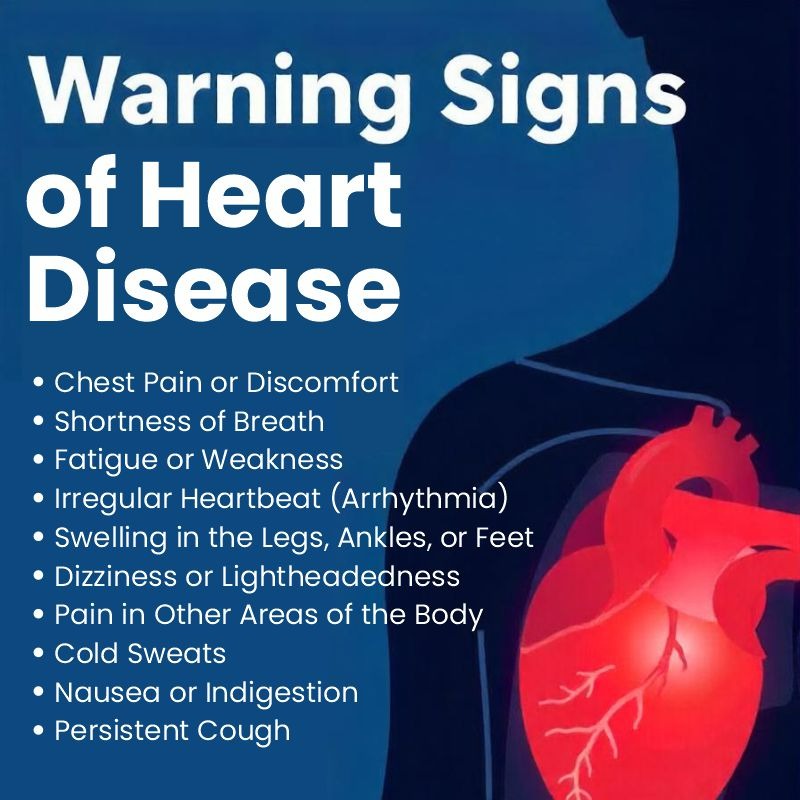Impact of High Blood Pressure on Heart Health
Sep 27, 2024

Heart disease is one of the leading causes of death worldwide, and recognizing its early symptoms can save lives. Many people overlook or dismiss the subtle signs of heart problems, assuming they are due to aging or other health issues. However, ignoring these early indicators can lead to severe complications. This blog will discuss the warning signs of heart disease you should never overlook to ensure you seek medical attention when necessary.
One of the most common warning signs of heart disease is chest pain, also known as angina. This discomfort can feel like pressure, squeezing, or a burning sensation in the chest. It may occur during physical activity or stress and subside with rest. However, any persistent chest pain should be taken seriously, as it could indicate restricted blood flow to the heart.
Struggling to catch your breath during normal activities can be a sign of heart failure or a blocked artery. When the heart isn’t pumping efficiently, fluid builds up in the lungs, making it difficult to breathe. If you experience unexplained shortness of breath, particularly when lying down, it’s crucial to consult a doctor immediately.
While feeling tired after a long day is normal, constant fatigue without a clear cause could indicate heart disease. If you feel unusually weak or exhausted during simple tasks like walking or climbing stairs, your heart could be struggling to deliver enough blood to the body.
A sudden change in your heartbeat, whether faster, slower, or irregular, may point to underlying heart issues. While occasional irregular heartbeats are standard, consistent or severe palpitations could signal conditions like atrial fibrillation, which increases the risk of stroke and heart disease.
Swelling in the lower extremities can indicate poor blood circulation, often linked to heart disease. When the heart is not functioning correctly, it struggles to pump blood efficiently, leading to fluid retention in the legs, ankles, and feet. If swelling persists, it’s time to seek medical advice.
Feeling dizzy or lightheaded, especially during physical activity, can signal a drop in blood pressure or poor circulation due to heart problems. Episodes of fainting or sudden dizziness should not be ignored, as they may be symptoms of severe heart conditions like arrhythmias or valve problems.
Heart-related pain isn’t limited to the chest. It can radiate to the arms, neck, jaw, back, or stomach. This is often described as a discomfort that spreads, especially on the left side of the body. If you experience any unexplained pain in these areas, particularly in combination with other symptoms, it could be related to heart disease.
Breaking out in a cold sweat without any physical exertion is another warning sign of heart disease you should never ignore. This symptom can occur when your heart struggles to pump blood effectively, signaling a heart attack or other cardiovascular issues.
Although these symptoms are often attributed to gastrointestinal issues, nausea, and indigestion can sometimes be signs of a heart attack, especially in women. If these symptoms appear suddenly and are accompanied by chest pain or discomfort, seek medical help immediately.
A lingering cough that produces white or pink mucus could indicate heart failure. When the heart is unable to keep up with the body’s needs, fluid leaks into the lungs, resulting in a chronic cough. When paired with other signs like shortness of breath or swelling, this symptom may point to a severe heart condition.
If you experience any of the above warning signs of heart disease, you should never ignore them. It’s important to consult a healthcare professional as soon as possible. Early detection can lead to more effective treatment and a better quality of life. Heart disease is preventable and manageable when caught in its early stages, so don’t wait until it’s too late.
While awareness of the warning signs of heart disease is crucial, prevention is even better. Here are a few steps to lower your risk of developing heart disease:
Maintain a healthy diet rich in fruits, vegetables, and whole grains.
Exercise regularly to keep your heart strong and improve circulation.
Quit smoking and limit alcohol consumption.
Monitor your blood pressure and cholesterol levels.
Manage stress through relaxation techniques like meditation or yoga.
By making these lifestyle changes, you can significantly reduce your chances of developing heart disease.
Conclusion
Understanding the warning signs of heart disease, which you should never ignore, can save your life. Early intervention is critical; recognizing symptoms like chest pain, shortness of breath, and fatigue can help you take prompt action. Don’t hesitate to seek medical attention if you’re experiencing any of these signs. Regular check-ups and a heart-healthy lifestyle can help you stay on top of your cardiovascular health and prevent complications.